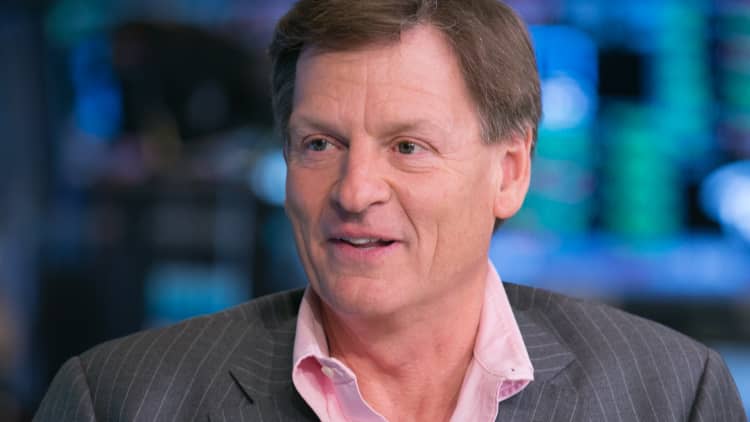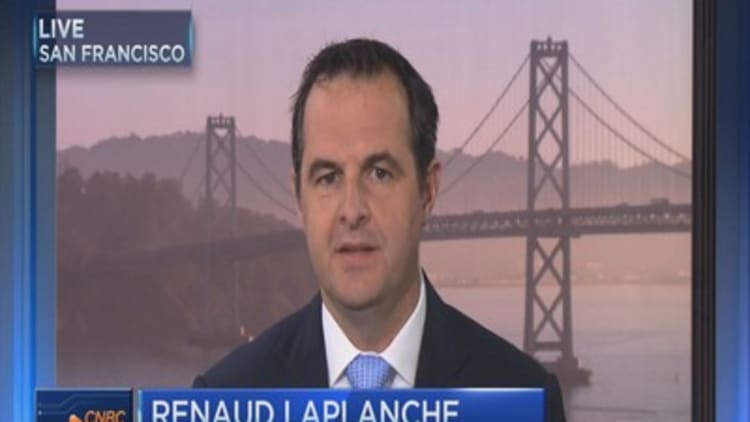Movie buffs will soon get to know the name Michael Burry from his portrayal by Christian Bale in "The Big Short," based on the best-selling book by Michael Lewis.
At the same time, Burry, who made a fortune in last decade's financial crisis by betting that the housing bubble would burst, is also gaining a following north of Hollywood, as a Silicon Valley tech investor.
The 2015 version of Burry is taking a more optimistic approach and going long mortgages. The former hedge fund manager, who lives blocks from Apple's headquarters in Cupertino, California, is an early investor in PeerStreet, an online marketplace for real estate-backed loans.
PeerStreet's mission is to open up a particular segment of the real estate market — residential, typically non-owner occupied — to a wider swath of investors, thus adding capital to the system and ultimately bringing down borrowing costs.
More importantly, by tracking the data on every loan and providing greater insight on the lender and the property, PeerStreet aims to insert accountability and transparency into a market that has historically been riddled with opaqueness.
"What happened in the crisis is there was practically no underwriting — if something could be sold it would be made," Burry said in an interview. "It's important for the next-generation alternative lending model that there be controls in place. There's somebody at the door checking for excess credit risk."

Burry was among a small group of money managers to recognize the structural flaws in the housing bubble and exploit it by wagering on its collapse. Through his former firm Scion, founded in 2000, Burry bought securities that would increase in value as subprime mortgage loans plummetted. He made $100 million for himself and $725 million for his investors, according to Lewis. Burry closed Scion in 2008.
The movie adaptation of Lewis' 2010 book hits a limited number of theaters this week, and will be widely released Dec. 23. Burry isn't the only character from the story who's investing in PeerStreet. Porter Collins (played by Hamish Linklater), Danny Moses (Rafe Spall) and Vincent Daniel (Jeremy Strong) are also backers. They worked with hedge fund manager and star short seller Steve Eisman (named Mark Baum in the film and played by Steve Carell).
PeerStreet co-founders Brew Johnson and Brett Crosby wanted as many smart financial minds as they could get in raising their initial $6.1 million in funding. But Burry was the real prize.
Read MoreGoldman's online lending could be effective: Pro
"After I read 'The Big Short,' he went to the top of my list of idols," said Johnson, who started his career as a real estate attorney before getting into tech in 2006. "He was in his closet and figured it all out in Cupertino. When we made out a list of people we'd like on our advisory board, he was the first name I put on the list."
Crosby, a former Google executive, had the connection to Burry. Both are investors in an online adventure travel start-up called Xola. Crosby and Burry were introduced by Xola CEO Scott Zimmerman, and the initial idea was that PeerStreet would try and lure Burry as an advisor.
After a scheduled half-hour conversation turned into a 90-minute meeting, Burry told Crosby and Johnson that he wanted to do more than just advise.
"He said, 'you guys have taken a lot of the learnings from the crash and applied it here in a really smart way,'" Crosby said.
PeerStreet, which is in the midst of raising another financing round, still has to prove it can turn its pitch into a big business. The platform was open on an invitation-only basis until recently — it's still only open to accredited investors. Now about 85 properties have been added, with $40 million coming from investors.
The company is working specifically with nonbank lenders providing capital to buyers of residential buildings that aren't owner-occupied. Think of a property buyer, who needs to borrow $500,000 in a hurry, and doesn't have the time to wait for a bank loan, if one would even be available. These loans would typically come with high interest and from local lenders with limited access to capital.
PeerStreet's view is that by performing its own due diligence on borrowers using a software-based underwriting engine, the company can match high-quality debt with a growing crop of yield-hungry investors. Lenders could thus do deals, sell the loans and then do many more deals, creating a new form of securitization.

Crosby and Johnson are confident there's investor demand — just look at the flood of money onto marketplace lending platforms like LendingClub, Prosper and SoFi.
For borrowers, PeerStreet's objective is to bring rates down from as high as 15 percent to between 6 and 12 percent. Accredited investors, serving as lenders, are able to generate returns after fees of 7.8 percent annually. PeerStreet makes money by charging a 1 percent servicing fee per loan.
"It's all about creating a more direct way for investors to invest in loans with more transparency," Johnson said.
Burry, who is hardwired to focus on risk, knows that plenty could go wrong.
The macro environment could potentially change in a way that financial modeling failed to predict. Additionally, competition may emerge from more aggressive lenders offering lower rates and with less stringent underwriting standards. That's how firms like Countrywide and Washington Mutual wiped out many smaller lenders in the housing bubble before they themselves collapsed amid surging defaults.
Read MoreCountrywide's Mozilo reportedly faces lawsuit
"One of the risks for anybody in the lending business is that being conservative can harm your competitiveness," Burry said.
As for the movie, Burry didn't want to say much before the release. Regarding Bale's characterization, Burry said he spent about 12 hours with the actor over the course of several phone calls and meetings, and he's pleased with the outcome.
"Christian is an incredibly professional actor," Burry said. "I certainly can't be unhappy with his portrayal or effort he put in."



